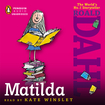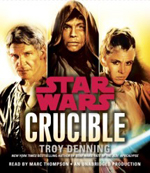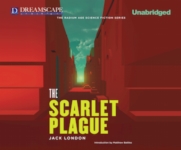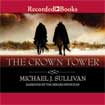
 Matilda
Matilda
By Roald Dahl; Read by Kate Winslet
Publisher: Penguin Audio
Publication Date: 3 July 2013
ISBN: 9781611761849
[UNABRIDGED] – 5 hours
Themes: / fantasy / telekinesis / children / school / libraries / bullies /
Publisher summary:
Matilda is a sweet, exceptional young girl, but her parents think she’s just a nuisance. She expects school to be different but there she has to face Miss Trunchbull, a kid-hating terror of a headmistress. When Matilda is attacked by the Trunchbull she suddenly discovers she has a remarkable power with which to fight back. It’ll take a superhuman genius to give Miss Trunchbull what she deserves and Matilda may be just the one to do it!
This book made me so nostalgic for childhood, mostly because Roald Dahl is a wizard who can see through a child’s eyes but also because he was such a huge influence on me when I was a kid. Matilda was one of my favorite Roald Dahl stories, and hearing it narrated by Kate Winslet was amazing—probably the best narration I’ve heard. She colors every single character a fully realized personality, from syrupy sweet to hilariously grotesque. I think Kate Winslet is doing in narration what Quentin Blake did for Roald Dahl in illustration.
The story is Roald Dahl at his best: it is sarcastic and dark (featuring a bingo-obsessed mother, a dishonest father, and a headmistress who throws children out windows for eating in class) but it’s also hilarious, magical, and hopeful.
Matilda Wormwood is a very small, sensitive, and brilliant girl who has the misfortune of being born to gormless idiots. Mr. Wormwood is a rat-faced used-car salesman who’s really only interested in people who boost his ego. He seems allergic to his daughter, mainly because she is much cleverer than him. Mrs. Wormwood, when she’s not off playing bingo, sits around watching American soaps and thinks “Looks is more important than books!”
Matilda’s good morals and quick wits unsettle her parents, which makes them even more dismissive and neglectful of her. Her only escape is to visit the local library where she devours the whole children’s section in no time. The amazed librarian than helps guide the little girls through all the classics, from Charles Dickens and Jane Austen to George Orwell and HG Wells.
“The books transported her into new worlds and introduced her to amazing people who lived exciting lives. She went on olden-day sailing ships with Joseph Conrad. She went to Africa with Ernest Hemingway and to India with Rudyard Kipling. She travelled all over the world while sitting in her little room in an English village.”
Reading all this literature awakens something in Matilda. She realizes that she now has a view on life that her parents have not experienced and never will, and that there’s far more to life than cheating people and watching television.
But she’s only four, so she’s stuck with them, “no matter how asinine.” To stop herself from going crazy, she beings to play mischievous pranks on them to punish them for every wrong they do. And when she starts school and meets even nastier bullies, she must use her brain power to develop new techniques for helping good people and punishing rotten ones.
I love the honesty Roald Dahl puts into his children’s stories. Children are often taught they must respect and obey their parents and teachers no matter what, as if we live in some utopia where all adults are intelligent, caring protectors. But Roald Dahl is not afraid to tell children the truth: sometimes monsters are real, and sometimes they look just like the people who have the most power over you or are supposed to care about you. People should earn trust and respect through their actions, not get it automatically because of their authority, age, or status.
Roald Dahl also teaches the other great wisdom: the world is full of idiots and oversized egos, and the best way to survive them is to keep your wits sharp and find the humor in every situation.
Posted by Marissa van Uden
 Aftermath (The Supernova Alpha Series #1)
Aftermath (The Supernova Alpha Series #1) Crucible (Star Wars)
Crucible (Star Wars)
 The Wonderful Story of Henry Sugar and Six More
The Wonderful Story of Henry Sugar and Six More The Crown Tower (The Riyria Chronicles #1)
The Crown Tower (The Riyria Chronicles #1)